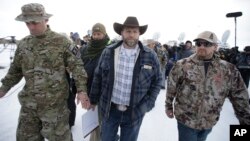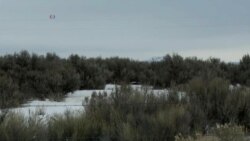Armed anti-government activists pressed on with their occupation of a wildlife reserve in the northwestern U.S. state of Oregon on Tuesday, despite the father and son at the center of the group's protest returning to jail and distancing themselves from the activists.
What began with a splinter group from peaceful protests backing local ranchers Dwight and Steven Hammond has turned into a four-day standoff focused on larger complaints about the way the federal government manages the land it owns, especially in western states.
The group, led by Ammon Bundy, has pledged to stay for as long as is necessary to achieve its goals. Harney County Sheriff David Ward told them it was time to leave his community.
"You said you were here to help the citizens of Harney County," he said Monday. "That help ended when a peaceful protest became an armed and unlawful protest."
It is not clear how many people are involved in the standoff at the Malheur National Wildlife Refuge. Organizers indicated at one point there were as many as 100 people there, but Bundy declined Monday to give a number.
A collection of local and federal law enforcement agencies, including the FBI, are collaborating on a response to the situation, but so far have not taken any direct action against the group.
White House spokesman Josh Earnest said President Barack Obama is aware of the situation and "hopeful it can be resolved peacefully and without violence."
WATCH: Related video report
The ranchers -- 76-year-old Dwight Hammond and his 46-year-old son, Steven -- turned themselves in Monday to return to prison after a federal appeals court ruled they had to serve five-year terms for setting fires on federal land they had used to graze their cattle. Their attorneys said they would seek clemency from Obama to win their freedom again.
Bundy's family had its own month-long standoff with federal authorities in 2014 over unpaid fees the government said they owed for letting their cattle graze on federal land in Nevada. Hundreds of supporters joined the Bundys and eventually the government backed down and decided to return the cattle it had confiscated to try to force payment.
The federal government's land ownership has long been a contentious issue, particularly in the western part of the United States. According to a report by the Congressional Research Service, federal agencies own 28 percent of the country's land, most of which is in the western states and Alaska.
At 53 percent, the state of Oregon has the fifth-highest percentage of federally owned land.






